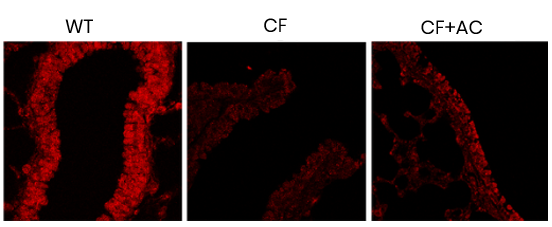Chronic lung infections, especially in cystic fibrosis (CF) patients, are increasingly difficult to manage due to rising antibiotic resistance. This technology introduces a non-antibiotic therapy that harnesses sphingosine (SPH), a natural lipid with antimicrobial properties, to treat and prevent bacterial lung infections. Treatment with SPH restored deficient SPH levels in CF airways when administered via inhalation, bolstering innate immune defense and offering a novel solution beyond conventional antibiotics. Importantly, we have developed proprietary, patent-protected SPH analogs with demonstrated in vitro efficacy.
- Treatment of bacterial lung infections in cystic fibrosis patients
- Prophylactic use in CF or other patients susceptible to Pseudomonas aeruginosa infections
- Alternative therapy for pulmonary infections in ventilated patients or those with COPD, burns, trauma, or sepsis

Reduced SPH levels in the trachea of CF mice can be rescued by inhalation of acid ceramidase (AC) or SPH
- Antibiotic-free approach leveraging natural immune mechanisms
- Broad-spectrum antibacterial activity, independent of immune cells
- Easily administered via inhalation
- Proprietary patent-protected SPH analogs
- Concept validated in CF mice: inhalation of SPH, acid ceramidase (AC), or FTY720 prevents and cures P. aeruginosa lung infections.
- Reduced SPH confirmed in CF human and mouse airway tissues
- Proprietary SPH analogs synthesized and tested in vitro


